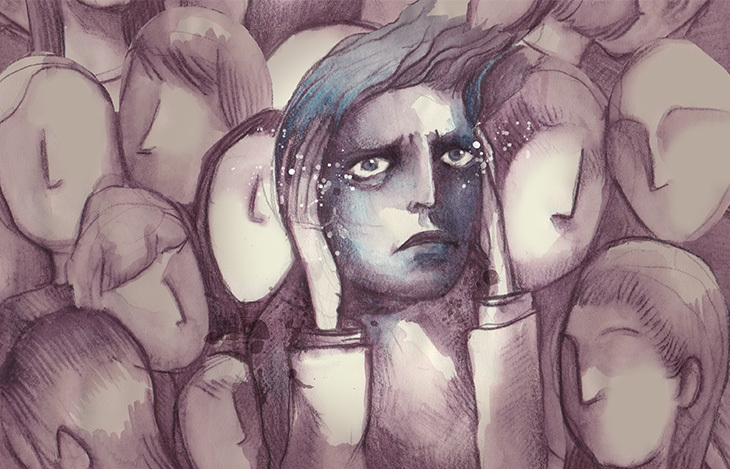
Most people think about a real event or imagined scenario that makes them feel uncomfortable. A new mother might imagine accidentally injuring her baby, or someone could envision a deadly traffic accident while driving down the interstate. However, in some cases, intrusive thoughts become all-consuming and interfere with the ability to live a normal life.
Intrusive thoughts are negative thoughts that enter people’s minds against their will. The “intrusive” label comes from the fact that these thoughts often appear at random or inconvenient times and are persistent, meaning a person continues thinking about them despite trying to stop. These types of thoughts cause severe anxiety, particularly in those who have underlying mental illnesses.
Intrusive thoughts don’t fit a specific template, but often fall into categories such as the following, according to Calm Clinic.
- Unwanted memories: Many people experience flashbacks of negative experiences that have happened in their lives. Those who have been diagnosed with post-traumatic stress disorder (PTSD) are especially vulnerable to this type of intrusive thought. However, anyone who experiences frequent anxiety likely experiences unwanted memories.
- Violent thoughts: Aggressive thoughts involve images of violence or a persistent fear of physical harm. In addition, these kinds of intrusive thoughts can trigger thoughts of carrying out violent or aggressive acts, such as harming oneself or others. Those with obsessive-compulsive disorder (OCD) are prone to violent thoughts.
Intrusive Thoughts and Generalized Anxiety Disorder
Generalized anxiety disorder (GAD) is “characterized by persistent and excessive worry about a number of different things. Individuals with GAD find it difficult to control their worry,” according to the Anxiety and Depression Association of America. GAD can also cause individuals to experience panic attacks, and intrusive thoughts often trigger these attacks. For example, individuals might find themselves unable to get rid of unfounded worries about their family members after intrusive thoughts of an accident enter their mind.
Interested in a Career in Psychology?
Explore DegreeIntrusive Thoughts and Obsessive-Compulsive Disorder
OCD is a “common, chronic and long-lasting disorder in which a person has uncontrollable, reoccurring thoughts (obsessions) and behaviors (compulsions) that he or she feels the urge to repeat over and over,” according to the National Institute of Mental Health. For example, a person with OCD might practice excessive hand washing or counting. Because of their propensity for disordered thought processes, those with OCD almost always experience intrusive thoughts as well. The compulsions and obsessions are a way of coping with intense anxiety brought about by the intrusions.
Intrusive Thoughts and Post-Traumatic Stress Disorder
PTSD is “a mental health condition that’s triggered by a terrifying event, either experiencing it or witnessing it,” according to the Mayo Clinic. Symptoms of PTSD include flashbacks, nightmares, severe anxiety, and uncontrollable thoughts. Intrusive thoughts can cause individuals with PTSD to re-experience the traumatic event over and over. “Often those with PTSD relive the event any time they come across a trigger. Once the event comes into their mind, they may find it hard to forget it,” Calm Clinic explains.
Cognitive Behavioral Therapy and Intrusive Thoughts
One of the most effective treatments for intrusive thoughts and the anxiety that accompanies them is cognitive behavioral therapy (CBT). Its goal is to provide individuals experiencing intrusive thoughts with coping mechanisms and tools. Because CBT is not usually associated with any risks or negative side effects, it is a popular choice for mental health professionals who treat patients with intrusive thoughts.
CBT combines cognitive therapy with behavior therapy in order to help patients find constructive ways to respond to intrusive thoughts when they arise, with the aim of lessening or eliminating them. Along with certain anti-anxiety and other medications, this approach can treat and prevent intrusive thoughts from happening.
Online Psychology Degree at King University
Earning an online bachelor’s in psychology is ideal for individuals who are interested in gaining a fuller understanding of human behavior, abnormal psychology, and more. King University’s undergraduate psychology degree gives students a foundational study of psychology that prepares them for the workplace or further study in graduate school.
This program is designed to give students the skills for careers in mental health, social services, and more. Skill development focuses on teaching students to apply knowledge of sociocultural diversity and psychological behaviors in professional roles. King University’s undergraduate coursework may be completed in as little as 16 months.